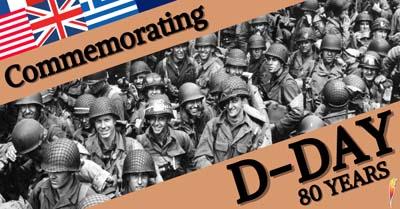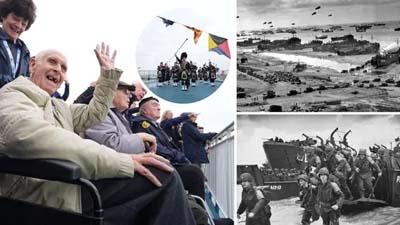
What should be commemorated at the 80th anniversary of Normandy landings?
Global Times
On June 6, the 80th anniversary commemoration of the Normandy landings, often referred to as D-Day, was held in the coastal region of Ver-sur-Mer, Calvados, France, with over 20 Western leaders in attendance. Although this significant commemorative event is likely to be recorded in history as the last quinquennial or decennial anniversary surviving veterans participated, some commentators suggested that this commemoration has garnered more attention due to the current heightened international tensions. The high-profile guests and politically charged speeches at the event, intertwined with increasingly geopolitical content, have led some to question whether this is a genuine commemorative event or a mobilization campaign under the guise of “unity.”

The most eye-catching scene was undoubtedly the speech by US President Joe Biden. Biden began by paying tribute to the veterans but quickly proceeded to draw comparisons between the 1944 Normandy landings and the present day, describing NATO as “the greatest military alliance in the world” while also asserting that “isolationism was not the answer 80 years ago and is not the answer today,” which media reports interpreted as a veiled criticism of his domestic political rival’s “America First” stance. However, among the geopolitical hotspots that the media had anticipated the commemorative event might touch upon, the Russia-Ukraine conflict was a constant theme throughout Biden’s speech, while the Palestinian-Israeli conflict seemed to vanish.
Biden is not the first US leader to call for an alliance at the D-Day commemorative event. Rather than being just an international event, the D-Day commemoration serves as a multifunctional gathering for promoting “Western-centric historical perspectives,” advocating American diplomatic ideals, and “uniting allies.” In fact, since the onset of the Cold War, the D-Day anniversary has had a dual function, serving as a commemoration for political influence of the Cold War, and highlighting the importance of unity among Western allies. The 40th anniversary of the Normandy landings in 1984 occurred during the height of the Cold War. During that commemoration, then US president Ronald Reagan prominently advocated for “Western unity.”
After the end of the Cold War, there was a period when the D-Day anniversary commemorations had a collective reflection on war and commemorated the anti-fascist struggle. During the 60th anniversary celebrations, then German Chancellor Gerhard Schröder was invited for the first time, along with Russian President Vladimir Putin. Now, with events like the Russia-Ukraine conflict further exacerbating divisions and antagonisms in Europe, the significance of the D-Day commemoration as a united resistance against fascism has become increasingly tenuous, if not almost entirely faded. France had intended to invite Russian representatives to the event, but this eventually did not happen. This reflects the frustration of upholding the true spirit of Normandy in the face of current realities. In its place, there is more emphasis on promoting bloc confrontation in the name of freedom and democracy.
There is no doubt that the few surviving Normandy veterans, along with the over 120,000 Allied casualties and countless innocent French civilians, who were part of the global struggle against fascism, deserve eternal commemoration. However, the question lies in what constitutes the true spirit of Normandy, as it relates to the ability to draw lessons from history and collectively forge a better future. Historical lessons should be correctly absorbed and distilled into timeless wisdom to be passed down, rather than being arbitrarily distorted, tailored, and exploited for contemporary political interests. The commemoration of the Normandy landings should be viewed within the context of the entire global struggle against fascism and within a fair perspective of World War II history.
Former US president Dwight David Eisenhower, who led this great battle, later recalled in a speech his experiences commanding troops on the European battlefield and said, “If the mothers in every land could teach their children to understand the homes and hopes of children in every other land – in America, in Europe, in the Near East, in Asia – the cause of peace in the world would indeed be nobly served.” Perhaps this was Eisenhower’s view of the spirit of Normandy – it is not only about allied unity but also about broader mutual understanding. As one veteran at the event said: “There are enough problems in the world without having to make your neighbor a problem.” Indeed, the greatest lesson left by World War II is that global conflict is undesirable; ensuring that war does not return is the true commemorative significance of the Normandy landings.
